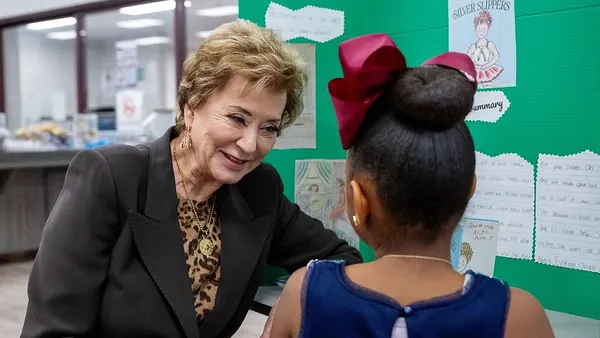Dive Brief:
-
Recruiting and retaining teachers of color is expected to be even more challenging under the Trump administration given its rollback of federal funding for teacher preparation programs that have helped diversify the educator workforce until now, according to a new policy brief issued by the University of California, Los Angeles School of Education and Information Studies.
-
The federal changes "will have lasting negative effects on students, schools, and school systems" as teacher diversity will likely decline, the brief said.
-
Rural schools, which are already hard-pressed to find and keep teachers, are expected to be significantly harmed by the cuts, per the brief. Pre-service teachers from lower socioeconomic backgrounds will also have a difficult time entering the profession.
Dive Insight:
Teacher preparation funding was among the earliest of the Trump administration's targets as it sought to wind down the U.S. Department of Education, cut down on spending, and weed out diversity, equity and inclusion efforts.
The Education Department announced a cut of $600 million to what it called "divisive" teacher grants in February. The department did not initially name the specific grants it slashed, but it later confirmed to K-12 Dive that the cuts included the Supporting Effective Educator Development Grant Program and the Teacher Quality Partnership Program. The Teacher and School Leader Incentive Program was also impacted, according to court documents later challenging the cuts.
By March, opponents of the cuts said they had already disrupted K-12 educator pipeline initiatives across multiple states.
The cuts were ultimately allowed to proceed after a legal battle launched by opponents ended with the U.S. Supreme Court greenlighting the federal funding reductions.
“The loss of federal funding will hinder efforts to address educational disparities and reduce the pipeline of teachers equipped to serve diverse student populations," Stanley Johnson Jr., senior project scientist at UCLA's Center for the Transformation of Schools and lead author of the research brief released in late August, said in a statement.
"This will disproportionately impact teachers of color, leading to the teacher population becoming less diverse, and school districts will face increased challenges in recruitment, retention, and innovative practices,” Johnson said.
In California, for example, these cuts meant the loss of a $7.5 million grant to California State University, Los Angeles that was being used to certify 276 teachers to serve in high-need or high-poverty schools in the Los Angeles and Pasadena Unified School Districts, as well as an $8.5 million grant to a Chico State University teacher residency program that prepares teachers to serve in high-poverty and hard-to-staff rural communities.
The brief recommends that school leaders:
- Advocate for state and federal policy changes, such as reinstatement of federal funding, state-level policies prioritizing educator diversity, and solutions for sustaining teacher pipelines.
- Seek alternative funding streams to expand state-level teacher residency programs, such as through partnerships with private foundations and philanthropic organizations.
- Expand mentorship and retention programs, offer mental health resources to prevent burnout, and support teachers in pursuing certification.
- Improve teacher compensation structures, especially in high-need areas, such as by increasing base salaries, offering competitive compensation packages, implementing salary incentives, and providing relocation stipends.
"It is essential for states to have the funding and political will to fund these efforts, as failure to do so can result in catastrophic outcomes for many students and place more financial responsibilities on the state related to future homelessness, incarceration, and social safety nets," the report said.














